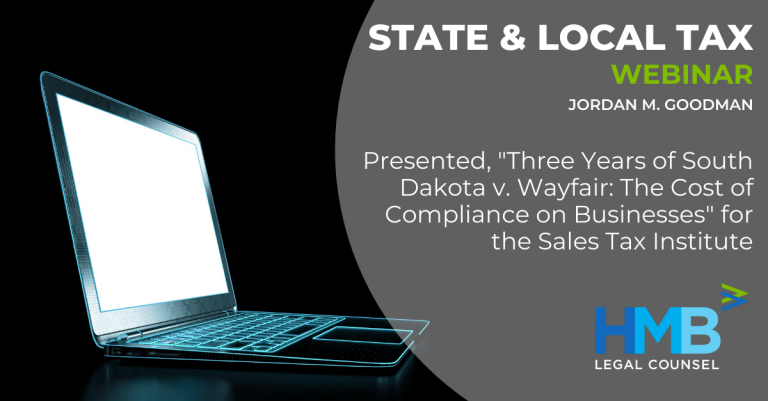In this second part of the series by Sales Tax Institute, Jordan M. Goodman, with other presenters, discusses how the South Dakota v. Wayfair decision has changed the landscape for businesses over the past three years. Part II takes a look at the cost of compliance on businesses following the decision with an emphasis on how it has impacted technology needs and staffing. Click here for Part I in the series.
To gather insight on how the Wayfair decision has affected the cost of compliance for businesses of various sizes and industries, Sales Tax Institute surveyed the audience about their experiences. They also caught up with sales tax experts including Jordan M. Goodman of HMB Legal Counsel, Cameron Stearns, Executive Vice President and CFO at Mountain Rose Herbs and Diane Yetter, President and Founder of the Sales Tax Institute, to find out how companies and clients have been affected.
When the U.S. Supreme Court evaluated South Dakota v. Wayfair, the Court noted that South Dakota’s sales tax system contained “several features that appear designed to prevent discrimination against or undue burdens upon interstate commerce.” Features like the safe harbor ($100,000 or 200 transactions) and no retroactive tax collection may have been designed to limit undue burden on taxpayers, but in practice, the results for many companies have been the opposite.
As Sales Tax Institute investigated the financial burden on taxpayers to comply with post-Wayfair requirements through their survey and interviews, two main costs emerged: the cost to implement or upgrade sales tax technology systems and the cost of needing more labor hours and staff to complete requirements.
For some businesses, these costs are so great that they are willing to ignore certain requirements altogether. Jordan Goodman has advised clients who believe the cost of compliance for sales tax in some states is so high that they would rather wait for the state to chase them than to comply voluntarily. That, of course, comes with its own risks, and that it’s a sentiment among some businesses is concerning.
View the entirely of Part II here.
View all parts of the series below.
Part I of the series covers the major challenges businesses have faced post-Wayfair and what's next for nexus.
Part III dives into marketplace nexus and the impact on marketplace facilitators and sellers' registration and collection requirements.
Part IV looks into the cost of compliance on businesses.



